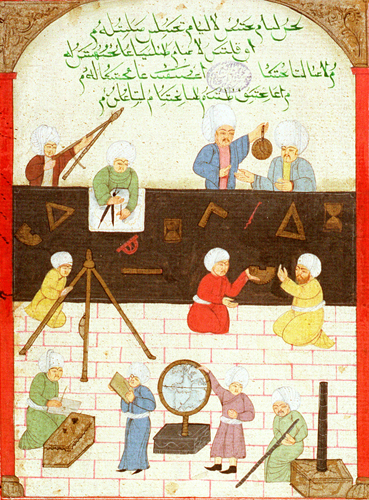Introduction & Astronomy
The spread of Islam stimulated the development of a wide range of science and technology founded upon a legacy from the ancient world.
This exhibition brings together a number of objects of Islamic origin that provide insight into some of the achievements of Islamic science.

Introduction

'His throne comprises the heavens and earth'
Qur'an, II, 256
 For Muslims the Qur'an establishes God's Law and reveals the true nature of reality. It is said to contain all knowledge and thus the acquisition of knowledge is seen as a religious act.
For Muslims the Qur'an establishes God's Law and reveals the true nature of reality. It is said to contain all knowledge and thus the acquisition of knowledge is seen as a religious act.
Muslim scholars did not separate areas of learning such as medicine, mathematics and literature; instead, each was regarded as a single part of a unified whole truth.
Related objects:
 | Celestial Globe |
 | Celestial Globe |

Astronomy
 Astronomy and mathematics enjoyed a privleged status in the hierarchy of Islamic sciences providing insight into the divinely inspired nature of the universe as well as solutions to everyday practical problems.
Astronomy and mathematics enjoyed a privleged status in the hierarchy of Islamic sciences providing insight into the divinely inspired nature of the universe as well as solutions to everyday practical problems.
Related objects:
 | Astrolabe |
 | Astrolabe with Geared Calendar |
Page last modified: 24 September 2019
The Bedouin tribes had navigated the deserts by observing the stars, and astronomical tables from Persia and India were translated into Arabic along with Ptolemy's Almagest and other significant Greek texts
Muslim astronomers established large observatories and developed instruments such as the astrolabe to a high degree of accuracy and sophistication. Astronomical data was essential to establish the Muslim calendar, based on lunar cycles, and the dates of religious festivals.

Whipple Museum of History of Science,
University of Cambridge
